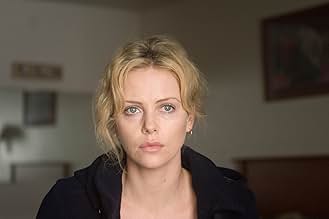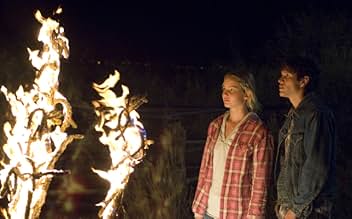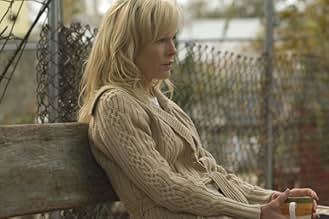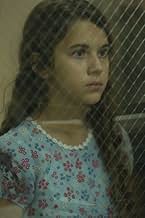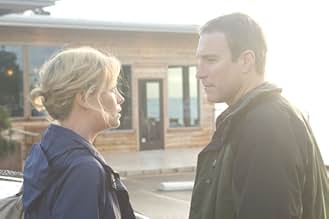IMDb RATING
6.7/10
22K
YOUR RATING
A drama with a two-tiered storyline concerning a mother and daughter who try to form a bond after the young woman's difficult childhood.A drama with a two-tiered storyline concerning a mother and daughter who try to form a bond after the young woman's difficult childhood.A drama with a two-tiered storyline concerning a mother and daughter who try to form a bond after the young woman's difficult childhood.
- Awards
- 2 wins & 3 nominations total
Diego J. Torres
- Cristobal
- (as Diego Torres)
Rosalia De Aragon
- Aunt Rebecca
- (as Rosalia de Aragon)
- Director
- Writer
- All cast & crew
- Production, box office & more at IMDbPro
Featured reviews
This is the first feature directing experience for Guillermo Arriaga. Already an established writer (Amores Perros, Babel, The Three Burials of Melquiades Estrada), Arriaga promisingly directs his own script in this movie. The movie follows the characteristic feature of Arriaga's script: fragmented stories, sometimes happening simultaneously, and sometimes happening at different time periods. The editing is intriguing, prompting you to try and seek connections between the different stories. The performances are amazing (especially Charlize Theron and Kim Basinger's). The landscape choices and the cinematography are beautiful. The Burning Plain is a poignant story about desperation, betrayal, trauma, revenge, guilt and self-hatred, with the stories of three female characters and different "plains" burningly interwoven to deliver a moving depiction of these themes... Highly recommended!
Films about interlocked fragmented stories aren't anything new to writer and director Guillermo Arriaga. As director, 'The Burning Plain' is his first feature film and its quite apparent that he has poured his heart into it. Here too the film involves three stories that are told separately but linked by the first scene.
However, the non-linearity of storytelling is initially confusing but once the tragic link is made apparent, the gut-wrenching conclusion (that explains the explosion shown in the first scene) hits the viewer hard. The setting is very simplistic but rich in atmosphere especially with the dark subtle undertones. The beautiful score contributes well.
Arriaga has gathered an impressive ensemble of actors who deliver wonderfully understated performances. Charlize Theron portrays Sylvia with a subtle intensity. Kim Basinger is skillfully restrained and Jennifer Lawrence shows tremendous potential. John Corbett, Robin Tunney, José María Yazpik, Rachel Ticotin, Brett Cullen, Tessa Ia and Joaquin de Almeida provide great support.
Despite the initial confusion, the narrative is strong. There are a few clichés that could have been avoided, such as the confession scene in the hospital, but these are very minor and don't effect the impact of the film. In the end, 'The Burning Plain' is a solid film.
However, the non-linearity of storytelling is initially confusing but once the tragic link is made apparent, the gut-wrenching conclusion (that explains the explosion shown in the first scene) hits the viewer hard. The setting is very simplistic but rich in atmosphere especially with the dark subtle undertones. The beautiful score contributes well.
Arriaga has gathered an impressive ensemble of actors who deliver wonderfully understated performances. Charlize Theron portrays Sylvia with a subtle intensity. Kim Basinger is skillfully restrained and Jennifer Lawrence shows tremendous potential. John Corbett, Robin Tunney, José María Yazpik, Rachel Ticotin, Brett Cullen, Tessa Ia and Joaquin de Almeida provide great support.
Despite the initial confusion, the narrative is strong. There are a few clichés that could have been avoided, such as the confession scene in the hospital, but these are very minor and don't effect the impact of the film. In the end, 'The Burning Plain' is a solid film.
Cause harm repeatedly to most parts of the body and they eventually grow desensitised, calloused and indifferent to the pain over time. This dispassionate, earthy and very dry aesthetic that film-maker Guillermo Arriaga applies to the world of his first major directorial outing is king; between the barren desert landscapes that permeate within the backdrops of his strangely distant and out-of-sync characters and the sparse narrative that intertwines it all together, The Burning Plain views life as a series of scars—cold and unrepresentative of the pain that brought them to the surface, but a firm reminder as such that nothing ever quite goes away, no matter how far you run. For the characters of Arriaga's story, a central catastrophe of sorts serves as the unfortunate catalyst that will bring them all together whether they like it or not. A burning trailer, housing two lovers sharing a passionate affair behind their families back, exploding in a rage of flames seemingly caused by accident. For them, the movie opens with their death thus absolving them from living with their irrevocable actions, but for those they leave behind the past stays as a constant and dictates largely how each of their futures will develop.
Serving as a somewhat humbled character piece that centres on a small group of intertwining stories between the two conflicted families, The Burning Plain is an unassuming and dry landscape of drama. For the majority of the feature, the movie is split between three narratives, most of which take place over different timelines told in a back-and-forth manner which informs but never confuses the viewer as to where each of these characters are going, and where they have been. This multi-layered and contorted style that Arriaga implements here can obviously get a little confusing at times, yet enough care is taken to allow each of the stories to have their own breathing room. As a result, the characters which take centre stage feel nicely developed and human—something integrally important to a story such as Arriaga's. In the end, while it seems that some plot developments never seem to be heading to any sort of meeting point, there exists a sort of catharsis and closure to the movie that ties everything together nicely, but perhaps too nicely. The ending is somewhat dubious, but nevertheless feels like the logical step when taken in retrospect.
As mentioned in the opening paragraph, a central theme to Arriaga's feature here is the suppression of emotion—of a cool, collected and strangely alien approach to relationships with other people. While there are plenty of moments where the director opts to balance such instances out with moments of palpable passion (most of which occur between the two burning lovers), the dominant motif here is that callous and introverted sense of misdirection and ambivalence that plays such a major part in a few of the central characters' stories. The performances then, which can be hard to grasp on to as a result, nevertheless do well to keep things human without ever sacrificing that uniquely cold tone. This isn't a feature that will immediately grasp you with its story or characters, and the performances from the cast are very much the same. Instead The Burning Plain opens up as it goes along, eventually climaxing in a series of finely performed expulsions of emotion. It is in this final act that much of Arriaga's story comes together and pieces fall into place, so it's appropriate that much of the movie's most cathartic, and warmer shades transpire here.
For The Burning Plain to truly come off the screen however, one has to feel for the characters that dominate the screenplay from the get-go, which unfortunately is not the case. While it is certainly evident that Arriaga's crafts an interesting and somewhat unique presentation to an otherwise familiar story thanks to his callous approach to much of the proceeding drama, the movie too often falls a little short of its intended destination thanks to the overly cold opening and unsurprising ending. The result is a feature which definitely succeeds in offering two hours of finely plotted drama, but which also fails at making any more of an impression. The characters are compelling in their own strange way, the narrative complicated but not to the extent that all hope is lost—for those two elements alone I could recommend The Burning Plain to viewers and that's not even taking into account the performances and imagery in twine. In the end however, Arriaga doesn't quite reach where he tries to; The Burning Plain is and enjoyable and rewarding experience, but it lacks the extra zest needed to carry it on through to something more profound and memorable.
Serving as a somewhat humbled character piece that centres on a small group of intertwining stories between the two conflicted families, The Burning Plain is an unassuming and dry landscape of drama. For the majority of the feature, the movie is split between three narratives, most of which take place over different timelines told in a back-and-forth manner which informs but never confuses the viewer as to where each of these characters are going, and where they have been. This multi-layered and contorted style that Arriaga implements here can obviously get a little confusing at times, yet enough care is taken to allow each of the stories to have their own breathing room. As a result, the characters which take centre stage feel nicely developed and human—something integrally important to a story such as Arriaga's. In the end, while it seems that some plot developments never seem to be heading to any sort of meeting point, there exists a sort of catharsis and closure to the movie that ties everything together nicely, but perhaps too nicely. The ending is somewhat dubious, but nevertheless feels like the logical step when taken in retrospect.
As mentioned in the opening paragraph, a central theme to Arriaga's feature here is the suppression of emotion—of a cool, collected and strangely alien approach to relationships with other people. While there are plenty of moments where the director opts to balance such instances out with moments of palpable passion (most of which occur between the two burning lovers), the dominant motif here is that callous and introverted sense of misdirection and ambivalence that plays such a major part in a few of the central characters' stories. The performances then, which can be hard to grasp on to as a result, nevertheless do well to keep things human without ever sacrificing that uniquely cold tone. This isn't a feature that will immediately grasp you with its story or characters, and the performances from the cast are very much the same. Instead The Burning Plain opens up as it goes along, eventually climaxing in a series of finely performed expulsions of emotion. It is in this final act that much of Arriaga's story comes together and pieces fall into place, so it's appropriate that much of the movie's most cathartic, and warmer shades transpire here.
For The Burning Plain to truly come off the screen however, one has to feel for the characters that dominate the screenplay from the get-go, which unfortunately is not the case. While it is certainly evident that Arriaga's crafts an interesting and somewhat unique presentation to an otherwise familiar story thanks to his callous approach to much of the proceeding drama, the movie too often falls a little short of its intended destination thanks to the overly cold opening and unsurprising ending. The result is a feature which definitely succeeds in offering two hours of finely plotted drama, but which also fails at making any more of an impression. The characters are compelling in their own strange way, the narrative complicated but not to the extent that all hope is lost—for those two elements alone I could recommend The Burning Plain to viewers and that's not even taking into account the performances and imagery in twine. In the end however, Arriaga doesn't quite reach where he tries to; The Burning Plain is and enjoyable and rewarding experience, but it lacks the extra zest needed to carry it on through to something more profound and memorable.
- A review by Jamie Robert Ward (http://www.invocus.net)
The writer Guillermo Arriaga, much famed for his trilogy of films with director Alejandro Gonzalez Inarritu, namely Amores Perros, 21 grams and Babel, steps behind the camera and debuts his own directing skills with 'The Burning Plain' a multi-layered affair that at its core tries to explore how we deal with guilt. If you didn't like the style of the afore mentioned films then chances are you wont get on with this either. The story is told in interweaving flashbacks and over different time periods and does require some work on the part of the viewer. But with plot pieces trickled out like a breadcrumb trail right up to the end, a great but subtle score and some breathtaking scenery it grips you as you slowly piece it all together. Added to that there are the two brilliant central performances from Charlize Theron and Kim Basinger, as the damaged mother and daughter and a supporting cast that in their various roles are also superb especially Jennifer Lawrence who rightly won an award at the Venice Film Festival. The cinematography is great and the colours are so warm you can almost feel the Mexican heat coming out of the screen. The direction while not quite as good as Inarritu proves that Arriaga was indeed paying attention and the overall feel is eerily similar. The only downside is that it does leave certain characters stories unfinished but that really is just a minor quibble in what is a very emotionally charged and challenging film.
The pace of the film (probably due to poor editing) is inconsistent. The first half of the film is engrossing, but the second half can be easily predicted. A lot of scenes of the second half can be edited out. Apart from the poor editing, the story itself and the way the story was told are intriguing. The film is women centric and portrays many issues concerning women: breast cancer, housework/chores, mother-daughter relationship, postnatal depression etc.. Charlize Theron suits the leading role particularly after her outstanding performance in the film Monster. But there again exists inconsistency of her appearance in the film (probably due to make-up/lighting filming) - sometimes she appears younger and sometimes older. It's understandable as the director's debut, but I think the director needs to work harder in order to coherently deliver an engaging and technically sound film.
Did you know
- TriviaIn a 2008 interview, Charlize Theron said taking her clothes off in front of cameras in this and any other film is is as easy as drinking for her. "I don't really think about it much. I read the scene and if it makes sense I do it. I treat it the same way as I would any other scene. Whether it's a nude moment or sitting at a bar drinking, it's all choices. I don't think about it as nudity."
- GoofsIn the airborne scene of the crop duster dusting the field, the course and actions of the dusting process were inconsistent with real crop dusting. Spraying began at a point well into the field, and no distinct pattern was set such as to avoid missing or re-spraying spots.
- Alternate versionsThere are two versions. Runtimes are: "1h 47m (107 min)" for the theatrical release, and "1h 51m (111 min) (Toronto International) (Canada)".
- SoundtracksFalling Star
Written by Ali Dee (as Ali Theodore), Henry Hey, Alana Da Fonseca (as Alana da Fonseca),
Zach Danziger (as Zach Denziger)
Performed by E. Wilson
Courtesy of DeeTown Entertainment
- How long is The Burning Plain?Powered by Alexa
Details
- Release date
- Countries of origin
- Official sites
- Languages
- Also known as
- Fuego
- Filming locations
- Production companies
- See more company credits at IMDbPro
Box office
- Budget
- $20,000,000 (estimated)
- Gross US & Canada
- $200,730
- Opening weekend US & Canada
- $58,749
- Sep 20, 2009
- Gross worldwide
- $5,642,478
- Runtime1 hour 47 minutes
- Color
- Sound mix
- Aspect ratio
- 2.35 : 1
Contribute to this page
Suggest an edit or add missing content




